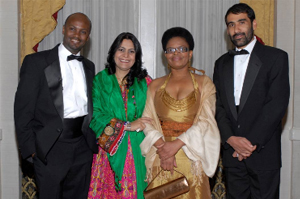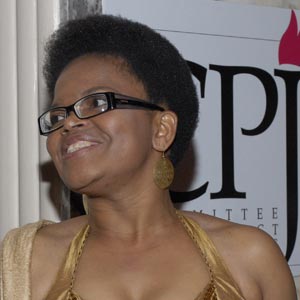New York, November 26, 2008–The Committee to Protect Journalists honored five journalists with its 2008 International Press Freedom Awards in a ceremony Tuesday night that highlighted journalists imprisoned worldwide. A Zimbabwean media lawyer who has successfully defended numerous journalists facing prison was honored for her lifetime achievements.
Bilal Hussein, an Associated Press photographer who was detained for more than two years by the U.S. military in Iraq. Hussein’s 2004 photo of Iraqi insurgents during the battle of Fallujah helped

“Iraq is one of the world’s most dangerous countries for journalists to live and work in because some of the parties at conflict did not want the truth to come out,” said Hussein, who spoke via live satellite link. “A journalist is like a candle that burns to light up the way for others. A journalist suffers tragedies in order to brighten the course toward the truth.” He offered words of encouragement to other journalists behind bars: “If I had to go through this again I would not hesitate if it is to get the truth out, because I know I will not be alone.”
About 800 people attended the benefit dinner, which raised $1.25 million. Jeff Zucker, president and CEO of NBC Universal, was dinner chairman. Gwen Ifill, managing editor of the PBS news show “Washington Week” and a member of the CPJ board, hosted the dinner at the Waldorf-Astoria Hotel.
Zucker noted CPJ’s participation in the newly launched Global Network Initiative, which for the first time sets telecommunications industry guidelines to protect privacy and free expression. “The battle over freedom of expression is moving online,” he said. “It is essential that we preserve freedom of speech on the Internet, which is such a powerful and positive tool for the dissemination of knowledge.”
Awardee Héctor Maseda Gutiérrez could not attend because he is imprisoned in Cuba, a victim of the 2003 “Black Spring” crackdown on the independent press. His award was presented by CPJ board member Christiane Amanpour, who called on those in attendance to sign a CPJ petition seeking his immediate release. The cards were collected and will be sent to Cuban President Raúl Castro. CPJ will hold Maseda’s award until he can attend a CPJ awards dinner and accept it in person. From prison, Maseda Gutiérrez sent a letter to CPJ accepting his award. The text is available on the CPJ Blog.
Other awardees focused on challenges to freedom of the press in Uganda and Afghanistan.
“No one should think we underestimate the resolve or capacity of the government to harm us,” said Ugandan editor Andrew Mwenda, founder of The Independent magazine. “Arrest, imprisonment, even death are very cheap costs for us to pay compared to the continued loss of freedom and liberty, and the deterioration of democracy, that would surely take place in the absence of our work and the work of others who share our values and beliefs.” While Mwenda was in the United States to accept his award, police in Uganda issued him a summons for questioning. Mwenda already faces 21 criminal charges for his work.
Danish Karokhel and Farida Nekzad, director and deputy director of Pajhwok Afghan News, spoke passionately about the pressures they face reporting in such a tumultuous environment. Nekzad, one of the region’s leading female reporters, highlighted the difficulties faced by women working in Afghanistan. “Journalists in general are targets but female journalists in particular face grave danger, not only from warlords, Taliban, political parties, clerics, and government but even from their own families,” she said. “Because of this separation of women, many stories remain untold.”

Beatrice Metetwa, a media lawyer from Zimbabwe and a former IPFA Award winner in 2005, received CPJ’s Burton Benjamin Memorial Award for lifetime achievement. New York Times reporter Barry Bearak, who was freed from a Zimbabwean jail this year after Mtetwa represented him, presented the award. Mtetwa, who received a standing ovation, noted that Zimbabweans are suffering from preventable diseases such as cholera and can no longer count on basic necessities such as clean water. To arrest and prosecute journalists for drawing attention to these ills, she said, illustrated the government’s arrogance.
Other presenters included author, editor, and reporter Steve Coll, CBS News anchor Harry Smith, and NBC foreign correspondent Richard Engel, who detailed the abusive treatment Hussein endured while in custody.
More details are on the CPJ Blog.